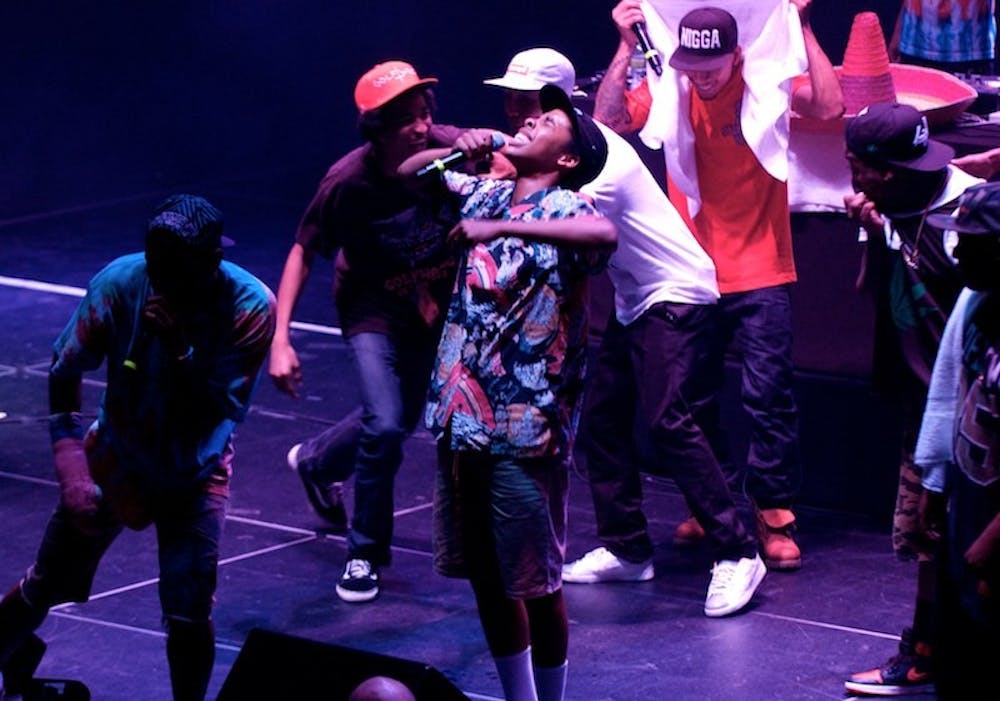Earl Sweatshirt is the most underrated rapper in the game. In my opinion, he is the best contemporary rapper. Luckily for us, the Spring Fair team somehow got one of the most reclusive and quiet rappers to come and bless us with a performance. In expectation of his upcoming concert, here is a short introduction to the most talented man you’ve never listened to.
Earl’s career started in his teens. He was a part of the wild Odd Future group which, to those few who don’t know, was a West Coast hip-hop collective spearheaded by Tyler, the Creator.
Earl’s music from the early years of Odd Future is fast-paced, violent, mildly disgusting and lyrically dense. The song that propelled him into the spotlight was creatively titled “Earl,” released when the rapper was only 15. The beat is in the classic Odd Future style, with buzzing synths and a simple drum break.
Earl — who grew up inspired by DOOM and other lyricists who used a kind of dense, assonance-heavy, lyrical flow — raps his ass off.
“Earl” was a single off his mixtape of the same name, the rapper’s first. The project is mixed poorly, filled with jokes and skits; everything about it is amateurish and bootleg.
Even in this early work though, you can easily hear his exceptional talent. Every verse is flawlessly written. Although the content is childish and reliant on cheap vulgarity, Earl delivers everything with cleverness and skill far beyond his years.
Just as the whole Odd Future crew started blowing up, Earl disappeared from the limelight. Due to poor behavior, Earl’s mother shipped him off to an academy in Samoa. When Earl returned, he was different.
Now more mature, his music had a new edge; it became more emotional and far more thoughtful. It was during this time that he dropped what is probably his most popular verse : his feature on Frank Ocean’s “Super Rich Kids.”
This is an exceptional verse, delivered from the perspective of privileged kids who do drugs and smash cars just to fill their time. The whole verse, Earl riffs on the long “a” sound, while creating this perfectly fleshed out image of wealthy ennui.
In 2013, Earl finally dropped his debut album, Doris. This is where Earl’s artistry really started to bloom. Besides just being clever and lyrical, Doris is the first musical project where Earl starts to delve into his personal issues. Every song has its own dark bent.
“Hive” is the standout track on the album. It is the darkest, toughest song on the project. The beat is a quiet drumline, a heavy rumbling bassline and an eerie choral harmony.
“Hive” is also a great example of how Earl’s lyricism works. Here is an example from the song: When Earl wants to say the classic rap phrase, “I spit fire,” he says instead, “Salivary glands, lighter fluid for the matchbox.”
That style of lyricism is what makes Earl so fun to listen to. His verses, while being all about personal issues with grief, death and depression, are written in a playful, clever way. “Reappear bearded on top of a Lear steering it into the kids’ ear again,” Earl enunciates with absolute nonchalance.
After Doris, Earl went quiet for a few years, blessing his fans with more and more impressive guest features. Then in 2015, he broke his silence by releasing what I believe to be his best album: I Don’t Like Shit, I Don’t Go Outside.
Whereas Doris is a spooky, eerie listen, I Don’t Like Shit sounds like degeneracy and pure, dreadful sadness. There is no redemption on this project, no great revelation. Earl only falls deeper and deeper into a dark hole, surrounded by roaches and smoke. The beats on this project are barely beats; they are generally these dark, alien sounds backed by awkward drum breaks.
“Grief” is probably the most memorable track of the album. The main part of the beat is this full, wash of dark sound. You hear whispers and sighs in this dark soundscape, only broken by the loud clapping snare and the rumbling kick.
Earl forgoes his usual laid-back delivery for a heartfelt, angry, energetic flow. “I ain’t been outside in a minute, I been living what I wrote,” he says, the honesty clear in his voice. After I Don’t Like Shit, Earl released a 10 minute... thing.
Calling it a song feels disingenuous because it is more of a collection of small song ideas. Calling it an EP also feels wrong because it is presented as one contiguous experience. Whatever it is, it’s called Solace, and it might be his most personal and powerful work of all.
Most of it is just instrumental, and Earl produces some crazy sounding beats, finding some deep, deep samples. Every once in a while, Earl layers short verses. His lyrics are his simplest and simultaneously his most powerful. “One foot stuck in a tar pit of my ways,” is a devastating line that is hard to forget.
A lot of rappers rap because they want to make songs. Earl seems to rap because he can’t not rap. His spitting feels as natural as breathing. Each song is more than a song: It feels like a window into this man’s broken soul.
I worry that people going to this Spring Fair concert will go into it with the wrong impression and leave disappointed. Earl is not someone you jump around to. Earl is not someone you listen to to “turn up.” Going to Earl’s show should be a therapeutic, powerful experience.





